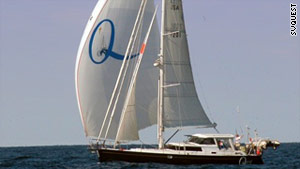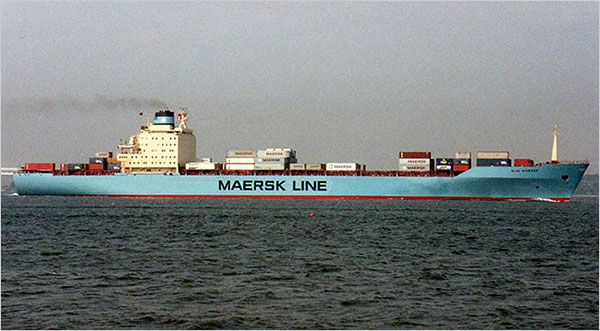Somali Pirates Take Five Ships in 48 Hours
The Somali pirates operating in the Gulf of Aden have gone on a spree:
NAIROBI (AFP) — Somali pirates seized ships from France, Britain, Germany, Taiwan and Yemen, defying world naval powers by prowling further out in the Indian Ocean to target victims.
Ransom-hunting pirates equipped with skiffs, guns and grapnels took five ships in 48 hours, the two latest on Monday targeting a British cargo ship and a Taiwanese fishing vessel.
At least 17 ships and more than 250 hostages are now in pirate hands.
“There were two more hijackings today. There is one Italian-operated British-owned ship and a Taiwanese vessel near the Seychelles,” an official involved in regional piracy monitoring told AFP on condition of anonymity.
The Seychelles government said it received a distress call saying that a Taiwanese fishing vessel, the MV Winfar 161, and its 29 crew was hijacked in its exclusive economic zone, north of Denis island.
Apparently, the pirates are venturing further out into the Indian Ocean to avoid the ships of the navies of the United States, France, India, China, and other countries that are now patrolling the Gulf of Aden.
Somali piracy continues to be a thorny problem. As costly as the problem has been—tens or even hundreds of millions have been paid out in ransoms so far—deploying navies is even more expensive. The application of more force won’t make it any more cost-effective and the barriers to entry are quite low.
The real solution to the problem is an effective Somali central government, capable of tracking down the pirates, putting them down, and bolstering the local economy to provide alternatives. Consolidating government has been the exception rather than the rule in the Horn of Africa so I honestly don’t see prospects for relief any time soon.
At the margins Somali piracy causes the price of oil to increase so we’re all bearing its costs to some degree. However, what it really does is reduce the comparative advantage of Gulf oil, making Nigeria, Venezuela, Mexico, and other suppliers more competitive. That reduces revenues for the Gulf oil producers. IMO our efforts should be more concentrated on motivating the Gulf states to increase the protection they’re willing to provide for shipping in the region than in providing it outselves.






What is your evidence for this? Mostly these pirates attack container ships, yachts and tugboats.
Even last year when the Saudi Aramco tanker was hijacked, prices were not affected.
Only 4% of the world’s oil passes through the Gulf of Aden, so it really isn’t a big deal–additionally, there has been a downturn in the number of pirate attacks since Obama has been in office.
Insurance costs for oil tankers in Gulf of Aden up 30%
See also the links here. That was 30% on top of a ten-fold increase.
Well, it seems more like a European, Indian and Gulf State problem than a US problem. The US could always develop local resources if the Dems would let us. Not to mention, the cost of a trip round Africa to a GOMEX refinery might start equaling out with the increase costs due to piracy real soon. As for container cargo, well, we in the US will just have to cut back on imported goods. Not to mention, there are few US flagged vessels about for international trade.
I believe the US should stay out of it, we wouldn’t want to appear arrogant, would we. Europe can man up for this fight. The Indians certainly seem to be willing to put down a pirate or two.
Here’s a story from Arabian Business that reports an unnamed Naval Officer has advocated shooting pirates that attempt to board merchant vessels. That solution is problematic in that the guns the ships would need have to enter many countries that advocate victimhood for law abiding citizens and the insurers won’t support aggressive actions by crews.
There is a link to report from January stating salaries for crews traversing the Gulf Aden have doubled, ships are convoying or taking the long way around. All supporting Dave’s assertion of increased costs for oil and other products from the area.
Consolidating the Somali government would be a nice idea (although that’s no guarantee that it will stop; look at Indonesian piracy), but that’s way off.
In the meantime, it’d be nice if they’d just declare the pirates to be Enemies of Mankind, like the British did back in the days of Empire, and then give orders for them to be sunk on sight. Complement this with following of pirate craft back to their safe harbors, to sink them there.
It won’t stop the impetus to piracy, but let’s face it – we don’t really care about the “root causes” of Somali piracy, and we’re not going to be solving them anytime soon. Let’s just clear up the bastards to the best of our abilities.
The way to stop Piracy is to make it non-profitable. Yes arming ship crews would cause issues with some ports but those issues could be relative easy to iron out. Also anytime one is taken, either the country that it is taken to or the country that the ship belongs to or someone on that country behalf needs to wipe out the pirates. That may result in some short term loses but would cost less in the long run.
Easy? Have you ever tried to take a gun to New York or New Jersey? How about California? That is just in the US. You get jail time for bringing guns into Mexico or Great Britain without prior license. Just like you would if you took one into New York or New Jersey. That is just to name a few of the various national gun control laws you’d run into. Plus, you have to deal with the issue of export if your country of origin controls export of weapons to your destination country.
Once a non-governmental vessel clears into a port, they are subject to that country, state and municipality’s laws. Some countries do give consideration to declared guns sealed on board ship but not all. And the kind of guns that would be needed, fully automatic and large caliber are strictly controlled even in countries with the right to bear arms like the US.
There are only two solutions to the problem. Make an example out of several of these pirates (i.e. blow them right out of the water) or continue pay ransom money to them for the foreseeable future.